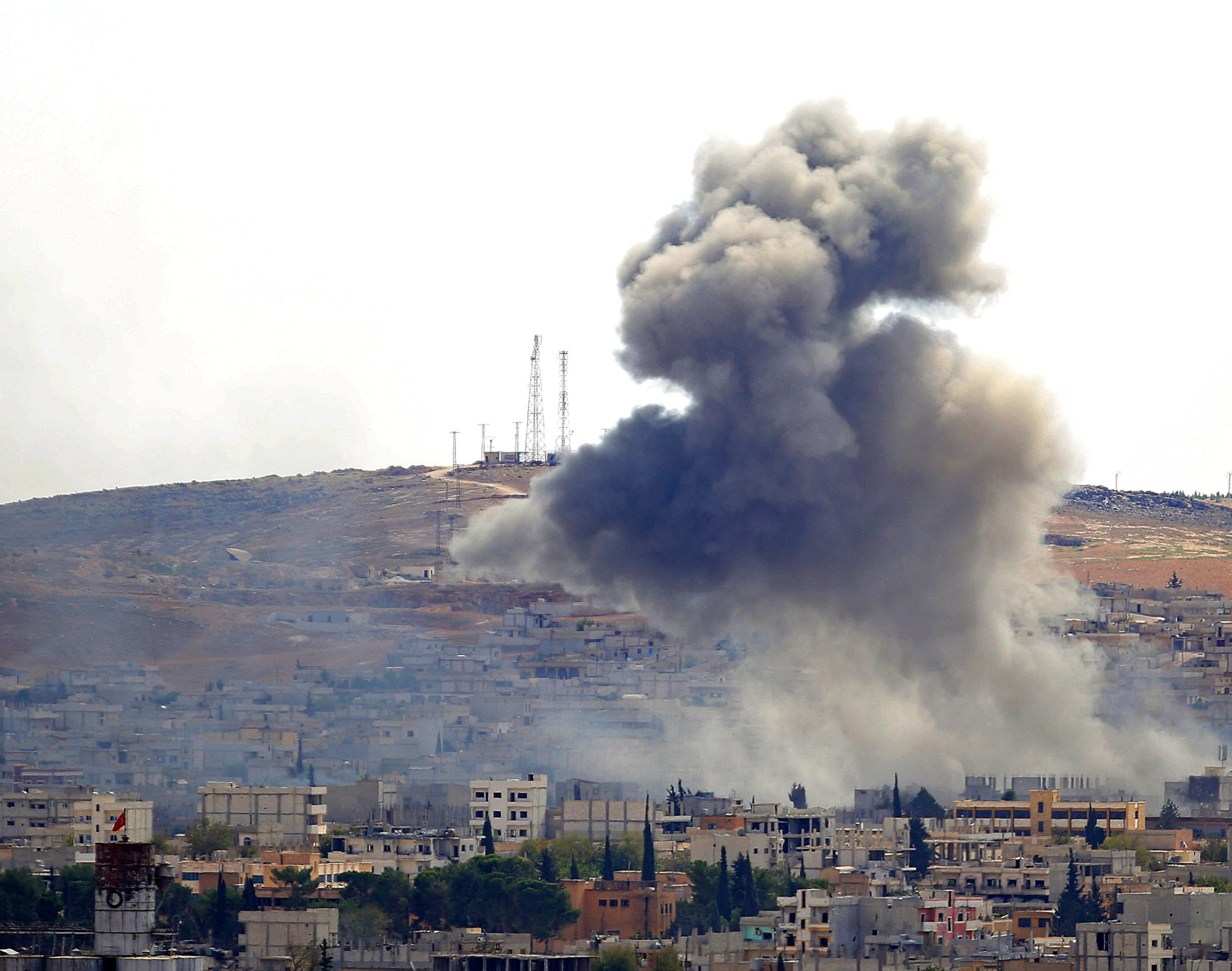
Coming back after two weeks away, it’s surprising that the Syrian town of Kobani hasn’t fallen to the Islamic State of Iraq and Greater Syria. Pentagon officials were predicting earlier this month that ISIS fighters would overrun the town, near the Turkish border, by mid-October, followed by widespread slaughters among the conquered population.
That hasn’t happened. And while that’s obviously good news in the short term for the city’s 200,000 largely-Kurdish residents, it’s tougher to handicap what it means for the long-term U.S.-led effort to “degrade and destroy” ISIS.
Earlier this month, U.S. military officers were speaking of ISIS’s “momentum,” and how its string of military successes over the past year meant that quickly halting its advance would likely prove difficult if not impossible. Yet, as far as Kobani is concerned, that seems to be what is taking place.
But that raises the stakes for the U.S. and its allies. Having smothered ISIS’s momentum, an eventual ISIS victory in the battle for Kobani would be a more devastating defeat for the U.S. military than an earlier collapse of the town.
There are concerns that the focus on saving Kobani is giving ISIS free reign elsewhere in its self-declared caliphate—that the U.S., in essence, could end up winning the battle while losing the war.
“The U.S. air campaign has turned into an unfocused mess,” Anthony Cordesman of the Center for Strategic and International Studies wrote Friday. “The U.S. has shifted limited air strike resources to focus on Syria and a militarily meaningless and isolated small Syrian Kurdish enclave at Kobani at the expense of supporting Iraqi forces in Anbar and intensifying the air campaign against other Islamic State targets in Syria.”
Senator Joe Manchin, D-W.Va., expressed frustration that the Obama Administration believes its latest fight against ISIS will yield success when the wars in Afghanistan and Iraq didn’t. “We understand the definition of insanity: continue to do the same thing and expect something different to happen,” he said Sunday on CBS’s Face the Nation. “If we can contain them there, leave them there, I don’t know what else to do. They’re intent on destroying each other, and they’ve been doing it for 1,400 years.”
The chattering classes are likewise not impressed by the fight for Kobani and the overall U.S. strategy against ISIS.
“The town, once dismissed as inconsequential by American commanders, has become not only a focus of the American operation against the Islamic State, known as ISIS, but also a test of the administration’s strategy, which is based on airstrikes on ISIS-controlled areas in Syria and reliance on local ground forces to defeat the militants,” the New York Times said in a Friday editorial. “A setback in Kobani would show the fragility of the American plan and hand the Islamic State an important victory.”
On Sunday, the Washington Post declared Obama’s strategy “unworkable,” and said “the United States will have to broaden its aims and increase its military commitment if the terrorists are to be defeated” (the Post‘s advocacy for the 2003 U.S. invasion of Iraq should be kept in mind while listening to such drumbeats).
For its part, the Pentagon is willing to trade 2003’s “shock and awe” bombing of Baghdad for a long-term campaign of modest and persistent air strikes that can stall ISIS until better-trained Iraqi forces and yet-to-be-tapped-for-training Syrian rebels can begin reclaiming territory.
The U.S. military is willing to take its time, not that it has much choice, given the situation on the ground and the curbs placed on it by the White House. “Here we are not three months into it and there are critics saying it’s falling apart; it’s failing; the strategy is not sound,” Rear Admiral John Kirby, the Pentagon spokesman, said Friday. “The strategy is sound and it’s working and there’s no plans to deviate it from right now.”
The Pentagon has made clear from the start that the battle against ISIS “will be a years-long effort,” Kirby said. “So I think a little bit of patience is required here.” Patience, of course, has never been an American trait. Democracies in general are ill-suited to waging lengthy wars.
But one thing the Pentagon has on its side is the dearth of casualties so far in what some are calling the third Iraq war. A Marine was killed Oct. 1 when he jumped from a V-22 aircraft in the Persian Gulf because he feared the aircraft was going to crash (it didn’t). A second Marine died in Baghdad Oct. 23 in what the Pentagon called a “non-combat-related incident.”
If the U.S. can turn the campaign against ISIS into a sustained, low-casualty operation like the drone wars it has been secretly waging for years in Pakistan, Somalia and Yemen, the public may go along. Whether that will be sufficient to degrade ISIS is, of course, a separate issue.
Read next: 19-Year-Old Marine Is First Soldier to Die Fighting ISIS in Iraq
More Must-Reads From TIME
- The 100 Most Influential People of 2024
- Coco Gauff Is Playing for Herself Now
- Scenes From Pro-Palestinian Encampments Across U.S. Universities
- 6 Compliments That Land Every Time
- If You're Dating Right Now , You're Brave: Column
- The AI That Could Heal a Divided Internet
- Fallout Is a Brilliant Model for the Future of Video Game Adaptations
- Want Weekly Recs on What to Watch, Read, and More? Sign Up for Worth Your Time
Contact us at letters@time.com